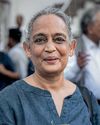
On the 90-foot road, an otherwise vibrant spot in Mumbai’s Dharavi, policemen take out a flag march appealing to people to stay home. Teams of the Brihanmumbai Municipal Corporation (BMC) go checking door to door for those with symptoms of COVID-19, such as high fever, persistent cough and breathing difficulty. With 86 positive cases and nine deaths (as on April 16) among its estimated 850,000 residents, Dharavi, one of Asia’s most densely populated slums spread over just 2.4 km, has been the focus of considerable attention by worried municipal officials.
By mid-April, the BMC had marked out nearly 400 ‘outbreak containment zones’ across Mumbai. Mumbai City and Mumbai Suburban are two of the 170 ‘hotspots’ of coronavirus in the country—and among Maharashtra’s 14—as classified by the Union ministry for health and family welfare (MoHFW). In Delhi, where the ministry has identified 10 hotspots, the number of containment zones has gradually risen to 55. It is these hotspots where the Centre and states aim to focus their energy and resources in the coming weeks of the extended lockdown to try and flatten the coronavirus curve.
Prime Minister Narendra Modi’s address to the nation on April 14 made this amply evident. Modi said that states and Union territories that will effectively contain the COVID spread in their hotspots could expect some relaxations from the prevailing restrictions after April 20. In their rounds of discussions, too, the prime minister and the chief ministers have concurred that the way forward is to stringently enforce protocols in the hotspots in order to contain any spurt in cases.
Esta historia es de la edición April 27, 2020 de India Today.
Comience su prueba gratuita de Magzter GOLD de 7 días para acceder a miles de historias premium seleccionadas y a más de 9,000 revistas y periódicos.
Ya eres suscriptor ? Conectar
Esta historia es de la edición April 27, 2020 de India Today.
Comience su prueba gratuita de Magzter GOLD de 7 días para acceder a miles de historias premium seleccionadas y a más de 9,000 revistas y periódicos.
Ya eres suscriptor? Conectar

FINGER CLICKING GOOD
Finally there’s a Smartphone that’s fit to fire your DSLR

RAISING THE BAR
In the dynamic world of mixology, where every drink tells a story and every pour is a masterpiece, a new chapter is being concocted by some of the bars. Here are eight bars that stirred up a riot.

TRUE BLUE
BLUE MAY BE a colour traditionally associated with all things royal, but when it comes to haute horology, especially Breguet, the hue lends its own cues.

DELICIOUS DINING WITH A SIDE OF LUSCIOUS VIEWS
Bonita, a quietly charming restaurant in Goa’s Arossim brims with flavour and a stunning landscape to boot.

A YEAR OF WONDER
Globetrotting to some of the more interesting travel options that spiced the calendar year

THE TASTE TEST - Some of the more interesting restaurants launched in Asia in 2024
In the dynamic culinary landscape of Asia, Spice embarks on a gastronomic journey through a kaleidoscope of noteworthy dining spots that shone through in 2024. From cosy havens celebrating rich cultural heritage using quality local ingredients to chic spaces blending global influences with a playful vibe, each venue offers something special, whether by the beach or beneath starry skies.

TECH TALK
From a Mac that became mini to gizmoheavy watches, from smart air purifiers to intelligent TVs, these top picks defined 2024.

BOOKS TO LOOK FORWARD TO IN 2025
Book review

PEACE ABOVE ALL
Devdutt Pattanaik offers an alternative view of the Harappan civilisation in his newest book, Ahimsa: 100 Reflections on the Harappan Civilization

A Wealth of SCHOLARSHIP
For art historian Aman Nath, 2024 was a great year for art books, demonstrating the range of India's cultural wealth